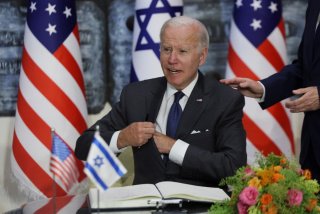The True Promise of Joe Biden’s Middle East Trip
Time will tell whether President Joe Biden’s Middle East trip proves to be a turning point, but those who dismiss its importance are missing the bigger picture.
The bigger point Biden made in the region and in his meeting in Jeddah with the leaders of the Gulf Cooperation Council+3 countries—nine leaders in all—is that the United States was not leaving the region. In his words, “We will not walk away and leave a vacuum to be filled by China, Russia, or Iran. And we’ll seek to build on this moment with active, principled American leadership.” He added that the United States “will not allow foreign or regional powers to jeopardize the freedom of navigation through the Middle East’s waterways, including the Strait of Hormuz and the Bab el-Mandeb. Nor will we tolerate efforts by any country to dominate another in the region through military build-ups, incursions and/or threats.” Finally, he placed the region in the context of global collective security against efforts to “undermine the rules-based order,” by not only Russia and China but specifically also Iran.
He emphasized partnerships not just in countering these threats but also coping with water security, food security, and cyber security. In advance of the trip, there was much talk about regional integration on security and even talk, coming out of Israel, about a Middle East Air Defense Alliance. Some observers, such as Dan Kurtzer and Aaron Miller, were quick to point out that nothing of the sort materialized from the trip and dismissed possibilities that anything like it would emerge down the road.
The failure to produce such a formal collective security alliance, this time as in the past, might suggest that the critics are right. But before rushing to judgment, we would note there are some clear differences today. Israel is now part of the Central Command’s area of operations—joining all the Arab states. Under that umbrella, much practical cooperation, table-top exercises, and operational joint exercises are happening, along with increasing integration of early warning and air and missile defenses—providing a collective ability to know when a missile has been launched, what its trajectory is, and what its interception point might be. Identifying and tracking drones is also increasingly integrated. Moreover, the United States has created Naval Task Force 150 to help secure the Red Sea and the Bab el Mandeb, and the Saudis and others are partnering with it.
True, at this point Washington’s rhetoric is ambitious, while the countries in the region will want to see how the Biden administration is following up on those words before they expose themselves greatly. But words matter—and already the talk of pivoting away from the region is gone. Giving them meaning will require increasing Central Command exercises which reflect greater regional integration and more American underpinning of it—with the additional virtue of demonstrating we are more embedded in the region and in a sustainable way because we have partners. Of course, it will also require showing we mean what we say about deterring Iran around the region and on the nuclear issue. The former will require more active interdiction of Iran’s provision of weapons to its proxies. The latter could involve accelerating KC-46 refueling tankers to Israel—thus enhancing its likely military option toward Iranian nuclear infrastructure and signaling the Iranians we are ready to support such action and perhaps, as Biden committed, take our own if Tehran will not alter the character of its nuclear program through diplomacy.
The irony as always is that the more we seem prepared to take military action, the less we are likely to have to employ it. President Biden’s trip was designed to signal the United States can be counted on in the region because we recognize that what happens there necessarily is tied to our larger effort to restore and perpetuate that rules-based international system. Those efforts can and will be successful if we have allies and regional partnerships moving forward. Time will tell whether this trip proves to be a turning point, but those who dismiss its importance are missing the bigger picture.
Ambassador Dennis Ross is counselor and William Davidson Distinguished Fellow at The Washington Institute for Near East Policy and teaches at Georgetown University’s Center for Jewish Civilization. Ambassador Ross’s distinguished diplomatic career includes service as special assistant to President Barack Obama and National Security Council senior director for the Central Region, special advisor to Secretary of State Hillary Rodham Clinton, Middle East Envoy to President Bill Clinton, and Director of Policy Planning for President George H.W. Bush.
Ambassador James F. Jeffrey is currently the Chair of the Middle East Program at the Wilson Center. He retired from the Foreign Service with the rank of Career Ambassador in June 2012. He was recalled to the Foreign Service in 2018 to serve as the State Department’s Special Representative for Syria, and in 2019 to serve concurrently as the Special Envoy to the Coalition to Defeat ISIS. He retired from those positions in November 2020. Between 2012-2018 he was the Philip Solondz Distinguished Visiting Fellow at The Washington Institute for Near East Policy, a Visiting Instructor at George Washington University, energy consultant, and member of the Secretary of Defense’s Defense Policy Board and the CIA Director’s External Advisory Board.
Image: Reuters.

